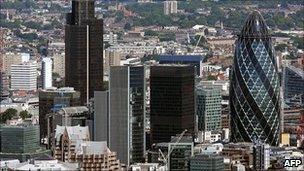More than half of Conservative donors 'from the City'
- Published

The research found the majority of big City donors were hedge fund managers and brokers
More than half of donations to the Conservative Party last year came from the City of London, according to the Bureau of Investigative Journalism.
Firms and individuals donated £11.4m in 2010, the bureau said, bringing the total from the City since David Cameron became leader to more than £42m.
But the government rejected any claims that donors were influencing policy.
The figures emerged a day after the government announced plans to increase the bank levy to £2.5bn this year.
Leader's Club
The Bureau of Investigative Journalism, which is a not-for-profit organisation, examined records of donations, external held by the Electoral Commission and Companies House.
It concluded that last year, City donations totalled 50.8% of all money given - up from just under 25% in 2005, the year in which Mr Cameron became Tory leader.
The bureau said that 57 individuals from the finance sector gave more than £50,000 last year, entitling them to membership of the Conservative Leader's Club.
According to the party's website, the club's members "are invited to join David Cameron and other senior figures at dinners, lunches, drinks receptions, election result events and important campaign launches".
The research indicated that the majority of big City donors were hedge fund managers and brokers rather than bankers.
John Curtice, politics professor at Strathclyde University, said it was "no surprise" that the City had given money to the Conservative Party because "money in politics tends to follow the expected winner" and Labour had attracted donations from financial institutions in the past.
But he said the "real surprise" about the story was that it showed David Cameron's efforts to end his party's reliance on handful of rich individuals had not worked.
"Much in the same way as the Labour Party tried under New Labour to avoid being so dependent on the unions as a source of funding and in the end have largely failed, perhaps the real interest in this story is that the Conservative Party tried to widen its funding base and perhaps, at the end of the day, has not really succeeded," he told the BBC.
'Collective interests'
He said it would fuel the public's suspicion that the rich could buy political influence or, at least, "undue access" - but there appeared to be little public appetite for alternative methods of funding parties such as from taxes.
Responding to the report, a Conservative Party spokesman said: "On the very day that the chancellor raised another £800m in tax from bankers - having already introduced the toughest rules on bankers' pay anywhere in the developed world - it beggars belief that anyone could claim that donors to the Conservative Party are influencing policy.
"It would be more pertinent to ask why Labour continue to allow their policy to be dictated by the unions, who provide 80% of their funds."
BBC business editor Robert Peston said: "The bulk of funding for the Tory party doesn't come from bankers; arguably the most important group of Tory donors are hedge fund managers, some of whom would be seen as critics, rather than allies, of the big banks.
"Even so, when a party becomes as dependent as the Tory Party has apparently become on a group of individuals and institutions with a number of identifiable collective interests - their shared concern about the impact of European financial services directives would spring to mind - it becomes more of a challenge for a prime minister to demonstrate that he is governing for all."
- Published8 February 2011
- Published29 November 2011
- Published23 August 2010